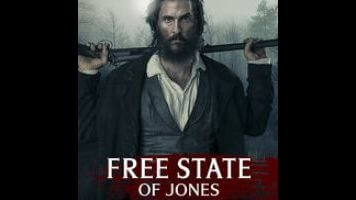Not even McConaughey can make good drama from Free State Of Jones

Free State Of Jones is the type of movie that tends to either win Oscars or become an also-ran punchline due to its failure to win Oscars. Neither distinction is particularly fair; there are enough laments about the sequel-saturated summer movie landscape that the mere existence of a wide-release historical drama targeted at adults counts as some kind of a win, awards traction be damned. What it doesn’t count for, though, is a good movie, at least not this time.
The story is almost interesting enough to fake it. Jones opens on a Civil War battle wherein Newton Knight (Matthew McConaughey) functions primarily as a medic for the Confederates. It becomes clear early on that Newt, as he’s called, is more interested in saving lives on his side than taking lives on the other—and that he’s not especially invested in “sides” to begin with. He increasingly sees the armed conflict as an attempt by rich Southerners to stay rich (noting that owning a certain number of slaves exempts certain families from the draft) and eventually deserts the Confederates, decamping for a community of runaway slaves in the swamps of Mississippi. These outcasts, with help from house slave on the inside Rachel (Gugu Mbatha-Raw), rally more poor farmers to their cause. Together they create their own separate “state” that’s not exactly Union-affiliated but fights the Confederates when push comes to shoot, which it often does.
On a scene-by-scene basis, this works as setup, though it’s a bumpy ride even early going. At first, director Gary Ross seems to be making up for eliding some of the more horrific violence in his Hunger Games movie by not flinching away from battlefield carnage here; there are shots of blown-off faces, and plenty of shockingly young men meet terrible fates. But if anything, the filmmaking here seems less assured than it was on his YA dystopia picture. Some sequences cover McConaughey from an absurd number of angles, achieving confusion not from the speed of the editing but the incoherent variety of shots. An early two-man dialogue scene, for example, utilizes at least four different angles for reasons that are never made clear. When Ross pulls back and sinks into a wide shot, he comes across some stark Western-style images. But he only sustains a handful of these moments. More often, he can’t resist going back in for a close-up, and then a close-up from a slightly different vantage.
This coverage-heavy restlessness is particularly damaging to Free State Of Jones, because it visualizes, rather than disguises, the story’s hodgepodge quality. Ross may not be a great director, but he has written some very good screenplays, none of which sprawl out like this one. Without a strong narrative flow carrying the movie along, Ross feels free to interrupt himself with Civil War photographs, onscreen text filling in historical details about the frequent time jumps, and, most audaciously, occasional interludes set in a courtroom 85 years after the events of the movie, where a descendant of Newt and Rachel is on trial for participating in an interracial marriage. The fact that many Civil War conflicts continued to fester and flare up in this country for the next century and a half, all the way up to our present day, does give Free State Of Jones a certain currency. It also creates the uneasy sensation that the movie itself may never end.
So it goes on, for well over two hours, with only McConaughey to anchor it. The resurgent actor is fine in the role, mostly avoiding white-savior martyrdom (though there is a scene where he literally removes a black man from bondage, something that has somehow not occurred to anyone else in the movie to try). But his performance lacks both the swagger and nuance of his best recent work. He’s placed opposite a lot of other actors, but none of them really connect, even the talented Mbatha-Raw; Newt and Rachel make the transition to a romantic partnership without so much as a kiss, and their most meaningful conversations are conveyed through unresolved fragments. Thanks to the courtroom subplot, their relationship becomes more totem than human.
Thinly developed characters can still inspire empathy, and there are plenty of moments in Jones that successfully boil the blood. The back half of the movie illustrates how the U.S. simply internalized the racial abuse of its pre-Civil War past, but it’s only intermittently successful as actual drama. Instead of building to a crescendo, the movie trails off. By the end, serious-minded adult moviegoers may find themselves longing for another product from the well-oiled sequel machine.